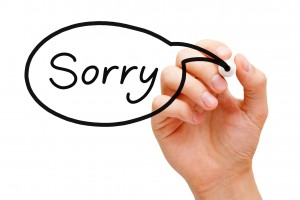Never Under Estimate The Restorative Power of an Apology!
Will your dispute be resolved or will stalemate be your status quo? Well, it all depends on whether you grasp the significance and power of an apology.
One key factor that has never ceased to amaze me is how the offering of a sincere and timely apology to a wronged party has the potential to stop a dispute in its tracks. It may also start the process of moving the parties towards mutual healing. Apologies are powerful when sincere.
THE POWER OF AN APOLOGY …. AND WHAT IS SO BAD ABOUT DEADLOCK ?
Random and insincere apologies understandably exacerbate a dispute. They are generally perceived of as being manipulative. They often cause people to become entrenched in their positions rather than being more conciliatory in approach. Insincere apologies do not make a dispute go away. They tend to drive a dispute towards deadlock. By same token do not under-estimate the power of an apology to break that deadlock
The reality of deadlock is that the stand-off between disputing parties often acquires a life of its own. This to the damage and detriment of the parties and those around them. In many cases this causes disputing parties to believe that the only way they can make the dispute go away is by using the Courts.
This course of action is not only time-consuming. But it is also an energy and money sapping exercise. It generally results in a lose – lose scenario for all concerned.
BREAKING THE DEADLOCK
Strangely enough, what is often needed to terminate a dispute, is for one of the parties to offer a sincere apology to the other. The apology could as a starting point be for their role in creating the dispute alternatively for keeping the dispute going.
The apology need not come from the original protagonist. But it has to come from one of the parties in order for the ongoing cycle of one upmanship and revenge to be broken. The apology needs to be sincere.
The essence of a sincere apology is one which is unreservedly made without motive of deceit or manipulation.
1, 2, 3… IN THE POWER OF AN APOLOGY
In a nutshell, in order to be effective, the apology needs to:-
- Take into account the other party’s experience of the situation causing offence;
- The apologising party must resolve not to knowingly or wilfully repeat any of their actions or communications which gave rise to or exacerbated the dispute ;
- The apology must be made unreservedly. In other words it must not be dependent upon the party also apologising. Undoubtedly such course of action is recommended. But if the apology is made on the basis that there be a counter-apology it is clearly not unreservedly made ;
- The Party must apologise, not justify or explain The apology must be made without justification or explanation for past conduct or words spoken; and
- Critically, don’t apologise and then immediately tell the other party how they should in the future act, speak or conduct themselves. Or worse still criticise them for how they should have acted, spoken or conducted themselves.
HOW WILL THE OTHER PARTY REACT TO THE APOLOGY ?
There is always the unfortunate possibility that communicating an apology may lead to the other party assuming the moral high-ground, with this giving rise to increased spiteful and revengeful behaviour.
In essence what the other party may chooses to do with the apology is neither predictable nor generally preventable. But, it is worth bearing in mind that from a court’s perspective, an apology is usually taken into account. (Its influence on outcome depending entirely upon the circumstances of the matter). Apologies in Law generally serve to act as mitigating factors from a judgement and outcome perspective.
A sincere and unreserved apology, timeously made provides the greatest opportunity for disputing parties to break the cycle of dispute. They also act to help people to release their resentment, bitterness, anger and possibly even hatred toward the other.
Apologies dilute disputes and they provide opportunity for promoting the development of new levels of trust and dialogue between parties. In family law matters, an apology is a critical requirement where children, extended family and close-knit friendship circles are involved.





